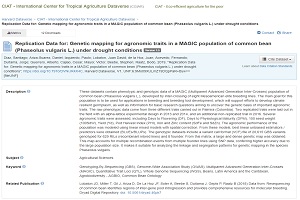Replication Data for: Genetic mapping for agronomic traits in a MAGIC population of common bean (Phaseolus vulgaris L.) under drought conditions
These datasets contain phenotypic and genotypic data of a MAGIC (Multiparent Advanced Generation Inter-Crosses) population of common bean (Phaseolus vulgaris L.), developed by inter-crossing of eight Mesoamerican elite breeding lines. The main goal for this population is to be used for applications in breeding and breeding tool development, which will support efforts to develop climate resilient germplasm, as well as information for basic research questions aiming to uncover the genetic basis of important agronomic traits. The raw phenotypic data come from three different trials carried out in Palmira (Colombia). Two replicated trials were laid out in the field with an alpha-lattice experimental design in 2013 and 2014, and an additional non-replicated trial in 2016. Several agronomic traits were assessed, including Days to Flowering (DF), Days to Physiological Maturity (DPM), 100 seed weight (100SdW), Yield (Yd), Pod Harvest Index (PHI), Iron and Zinc content (SdFe and SdZn). The agronomic performance of the population was modeled using linear mixed models with spatial correction. From these models, best linear unbiased estimators / predictors were obtained (BLUEs/BLUPs). The genotypic datasets include a variant call format (VCF) file of 20,615 GBS variants genotyped for 629 RILs (recombinant inbred lines) and 8 founder. From this matrix, a large and dense genetic map was obtained. This map accounts for multiple recombination events from multiple founder lines using SNP data, conferring higher accuracy due to the large population size. It makes it suitable for analyzing the linkage and segregation patterns for genetic mapping in the species Phaseolus vulgaris.

